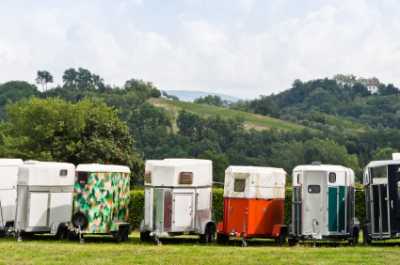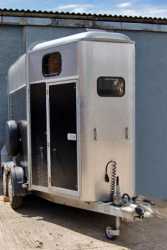|
By Jerry Tardif
So, you want to tow a horse trailer.
But you either already have a small vehicle you want to use for the towing, or want to purchase a small one to keep your gas consumption down with today's high prices and environmental concerns.
Unfortunately, such vehicles present many limitations regarding capability and safety.
Here are the issues you need to consider.
Towing safety is directly related to the weights of your tow vehicle and what you're towing.
You never want your trailer and payload to become "the tow vehicle" and the one you're driving to become "the trailer".
Therefore, one of the biggest factor you need to consider is the weight of the tow vehicle in comparison to that of the trailer and its payload.
Let's discuss what our vehicle will actually be required to pull down the road (and up steep hills).

Most people are going to want at least a 2-horse trailer.
That's because it's usually more fun to go on a new riding adventure with a friend than it is to go alone.
Even those trailering for the "show circuit" enjoy the companionship of one or more riders and horses.
There are 1-horse trailers available, though not many choices.
The reason is because by the time a 1-horse trailer is safely manufactured, it is not that much lighter or cheaper than a 2-horse trailer.
This is because it must meet the same safety requirements, such as needing double axles and wheels, electric brakes, etc.
Therefore, the weight and price of the trailer is often 70% or more of a good 2-horse trailer, yet you can never tow that second horse.
So most of us feel it's better to move up and have 2-horse towing ability for not much more money.
Now, let's look at the weight you need to be able to tow:
- Two average size horses (at 1,000 pounds each, that's 2,000 pounds total);
- A trailer that can handle this payload (2,300 pounds minimum); and
- Tack, some bedding for the floor, some hay for the ride, (another 100 pounds minimum).
The foregoing adds up to 4,400 pounds.
My 2-horse trailer is more typical and weighs 2,800 pounds — that doesn't even include a tack/dressing room.
If you want that, add another 400 pounds or so.
(For what it's worth, my trailer has a steel frame and all aluminum sides with a fiberglass roof.
It's a newer technology trailer meant to be light and strong.)
Let's be more practical and realize that we also need to carry other items.
Some of these items are very light in weight (e.g. an extra bridle or bits), but it still all adds up.
Will you carry some water for the horses?
How about a spare halter and lead line?
A second set of tack for the other horse?
A muck rake?
Broom?
How about some other "nice to haves?"
(wheel chock, a bale of hay or two, fly spray, first aid kit for you and the horses, fly mask, dressage whip, lunge whip, breast plate, cantle bag, saddle bags, riding boots, apparel, etc.)
As you can see, it doesn't take long to get the weight up.
If you're showing, you may be able to borrow from others, though if you always do so, it can get old for you and them.
If you ride the trails, you need to bring backups and other things along for safety and convenience sake.
The minimum tow capacity you're likely to need for two horses and the trailer is 5,000 pounds; a 6,000 or 7,000 pound towing capacity not only gives you some breathing room, it also makes for a safer and easier towing experience because you're not up against the limits of your vehicle.
But even at 5,000 pounds, you're not going to be able to use a small Jeep, RAV4, Forester, Escape, or some such.
And even if you could, these vehicles have a short wheelbase and a trailer is more able to jerk such vehicles around — it would not likely be a pleasant or safe-feeling ride.
You also can't expect a 4-cylinder or small 6-cylinder engine to do the job — they just don't have enough torque and your first hill would be both a slow and engine-wearing climb.
A bigger 6-cylinder would be better, but a V8 is going to be best.

|
If you go to a 1-horse trailer, you can cut some weight, but it won't be half that of a 2-horse trailer.
Neither will the cost be half and they will be difficult to find because the market is small so few are made.
In my conversations with several trailer manufacturers, most said it just wasn't cost-effective to produce them because few buyers want to spend what it costs to incorporate the same required features in a smaller package.
Also, such a trailer is more top-heavy because it's narrower and yet must be the same height as a 2-horse trailer.
And because it's narrower. it also tends to be even more claustrophobic for your horse.
Finally, you'll never be able to bring along another horse for your rides.
|
|
There are also some poorly built 1-horse trailers that are definitely not the best.
Most people pursuing such a trailer see it as their only affordable solution and are trying to keep their costs down.
Accordingly, some manufacturers trying to hit the lowest price point make compromises and produce a significantly lesser product.
As you can see, the sheer weight of your horse payload and a strong enough trailer to carry it sets some serious lower bounds for safe, small-vehicle towing.
And a short wheelbase vehicle in windy conditions will make a towing experience feel like a scary rollercoaster ride even at slower speeds.
The result is the need for a bigger vehicle when towing horses.
It doesn't mean you need to buy a big, multi-ton, dual-wheeled truck.
But a medium-sized pickup or SUV with a decent wheelbase is likely the minimum you'll need for a 2-horse trailer.
To determine how much tow vehicle you actually need, take advantage of the knowledge of the dealers.
For example, if you're going to buy a trailer, ask the trailer dealer your questions about a tow vehicle, such as, "will my current vehicle be able to tow this trailer?":
If it can't, then ask what kind and size of vehicle is required.
Even if you already have a trailer, a truck or SUV dealer can help you select the smallest, capable vehicle for the job.
Unlike a private seller of a trailer or vehicle who are focused primarily with getting rid of whatever they're selling and may not know enough about towing, trailer and vehicle dealers will be very concerned that they match you with a safe and capable solution — they will not want to be sued.
Therefore, if they don't know something, there will be someone else with which they can check, including the trailer or vehicle manufacturers themselves.
More Information:
Tow Vehicles
Getting Properly Hitched
Buy the Trailer or Truck First?
Buying a Good Used Trailer
Starting With Your First Horse Trailer
Common Trailering Questions
Wind and Trailering
Learning to Back a Trailer
Besides being an avid trail rider, Jerry Tardif is a technology consultant and a horse and nature photographer in SE Connecticut — see his work at: www.jerrytardif.com.
He is also co-founder and President of QueryHorse.
Back to Article Index
|